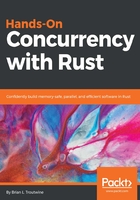
The interesting part
Let's create a default cargo project and confirm that we can emit the appropriate assembly for our machines. Doing this will be one of the important pillars of this book. Now, choose a directory on disk to place the default project and navigate there. This example will use ~/projects, but the exact path doesn't matter. Then, generate the default project:
~projects > cargo new --bin hello_world
Created binary (application) `hello_world` project
Go ahead and reward yourself with some x86 assembler:
hello_world > RUSTFLAGS="--emit asm" cargo build --target=x86_64-unknown-linux-gnu
Compiling hello_world v0.1.0 (file:///home/blt/projects/hello_world)
Finished dev [unoptimized + debuginfo] target(s) in 0.33 secs
hello_world > file target/x86_64-unknown-linux-gnu/debug/deps/hello_world-6000abe15b385411.s
target/x86_64-unknown-linux-gnu/debug/deps/hello_world-6000abe15b385411.s: assembler source, ASCII text
Please be aware that if your compilation of a Rust binary on OS X x86 will not run on Linux x86, and vice versa. This is due to the differences in the interfaces of the operating systems themselves. You're better off compiling on your x86 Linux machine or your x86 OS X machine and running the binaries there. That's the approach I take with the material presented in this book.
That said, reward yourself with some ARMv7 assembler:
hello_world > RUSTFLAGS="--emit asm" cargo build --target=armv7-unknown-linux-gnueabihf
Compiling hello_world v0.1.0 (file:///home/blt/projects/hello_world)
Finished dev [unoptimized + debuginfo] target(s) in 0.45 secs
hello_world > file target/armv7-unknown-linux-gnueabihf/debug/deps/hello_world-6000abe15b385411.s
target/armv7-unknown-linux-gnueabihf/debug/deps/hello_world-6000abe15b385411.s: assembler source, ASCII text
Of course, if you want to build release versions, you need only to give cargo the --release flag:
hello_world > RUSTFLAGS="--emit asm" cargo build --target=armv7-unknown-linux-gnueabihf --release Compiling hello_world v0.1.0 (file:///home/blt/projects/hello_world) Finished release [optimized] target(s) in 0.45 secs hello_world > wc -l target/armv7-unknown-linux-gnueabihf/ debug/ release/ hello_world > wc -l target/armv7-unknown-linux-gnueabihf/*/deps/hello_world*.s 1448 target/armv7-unknown-linux-gnueabihf/debug/deps/hello_world-6000abe15b385411.s 101 target/armv7-unknown-linux-gnueabihf/release/deps/hello_world-dd65a12bd347f015.s 1549 total
It's interesting—and instructive!—to compare the differences in the generated code. Notably, the release compilation will strip debugging entirely. Speaking of which, let's talk debuggers.